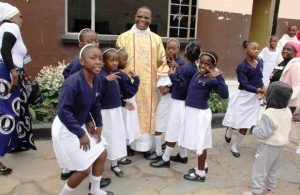But the angel said to them, “Do not be afraid. For see – I am bringing you good news of great joy for all the people: to you is born this day in the city of David a Saviour, who is the Messiah (Luke 2:10-11).
The child in the manger, in its vulnerability, is an image of fragile hope, the beginning of a new story that will culminate in the gift of life and salvation through the death and resurrection of Jesus the Christ. There have been and there are today many reasons to be afraid and to live in despair. In the most difficult days of history, Christians have time and again found consolation and hope in the good news of Jesus Christ that begins with the birth of the Saviour in Bethlehem.
Celebrations of Christmas in churches and families this year will be tempered by the physical distancing and other restrictions brought on by our concern to protect each other from the coronavirus. People will grieve for the many dead around the world and will express their gratitude for those who care for the sick with great dedication and courage.
The pandemic has torn the social fabric everywhere, causing massive unemployment and even hunger, rending our connections to each other, revealing and exacerbating inequalities, raising havoc and dissent, and threatening institutions of good governance. At the same time, violence and war continue, destroying the livelihoods of people with increasing numbers of refugees and migrants and killing so many men, women and children.
Even under these circumstances, however, there is a sound of angels in the air, proclaiming the birth of Christ with great joy. As Christians, we glimpse in this singular event, the birth of the child Jesus in a desolate village at the margins of the Roman empire, the fragile beginnings of our own redemption.
As people of faith, we know that in the Incarnation of the Lord, God, the Creator and Sustainer of all life, draws near to us, loves us compassionately, liberates and accompanies us. As people of hope, we glimpse in the birth of Jesus God’s “yes” to life, and the birth of new possibility, new life triumphing over death and despair. The Incarnation is God’s decisive “yes” to humanity and creation. In the Incarnation, God cares for us and raises us, gives up God’s very self to identify with us, becomes human to make us like him by grace.
This vision is embraced by the theme of the forthcoming assembly of the World Council of Churches in Karlsruhe, Germany: “Christ’s love moves the world to reconciliation and unity.” Encouraged and guided by this vision of the Incarnation of Christ, I pray for people and leadership of our member churches and all people with whom we share this planet that fear gives way to joy, and that this year of sadness, loneliness, and suffering may yield hope, courage, and loving service in the cause of justice and peace.
In a world of pain and death, the event of Christmas allows us to find consolation, lift our heads in hope, and glimpse in deep faith the triumph of life and love in the birth of Jesus. This is good news of great joy for all people. And so, despite everything, together with the angels we sing through our traditional carols: “Glory to God in the highest, and on earth peace, goodwill towards people!” (Luke 2:14).
Rev. Prof. Dr Ioan Sauca
Interim General Secretary
World Council of Churches






